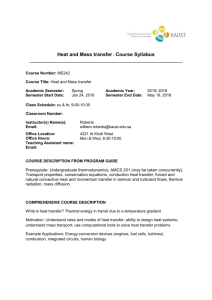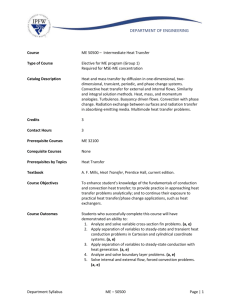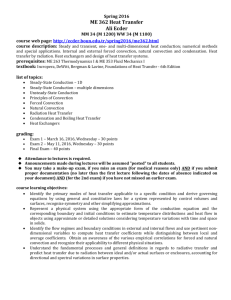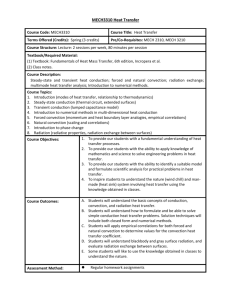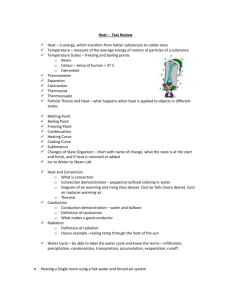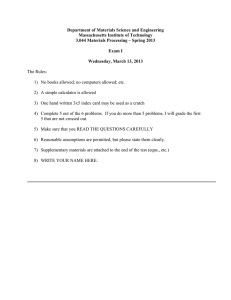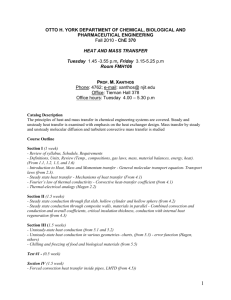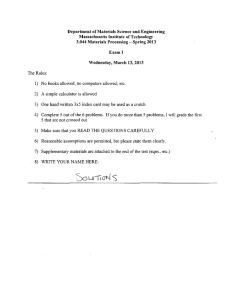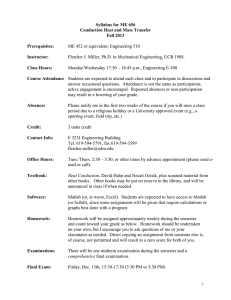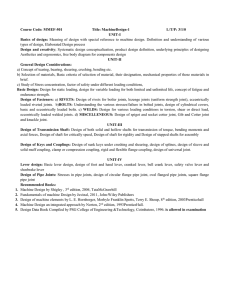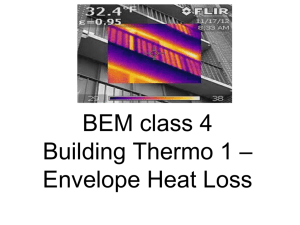Attendance
advertisement
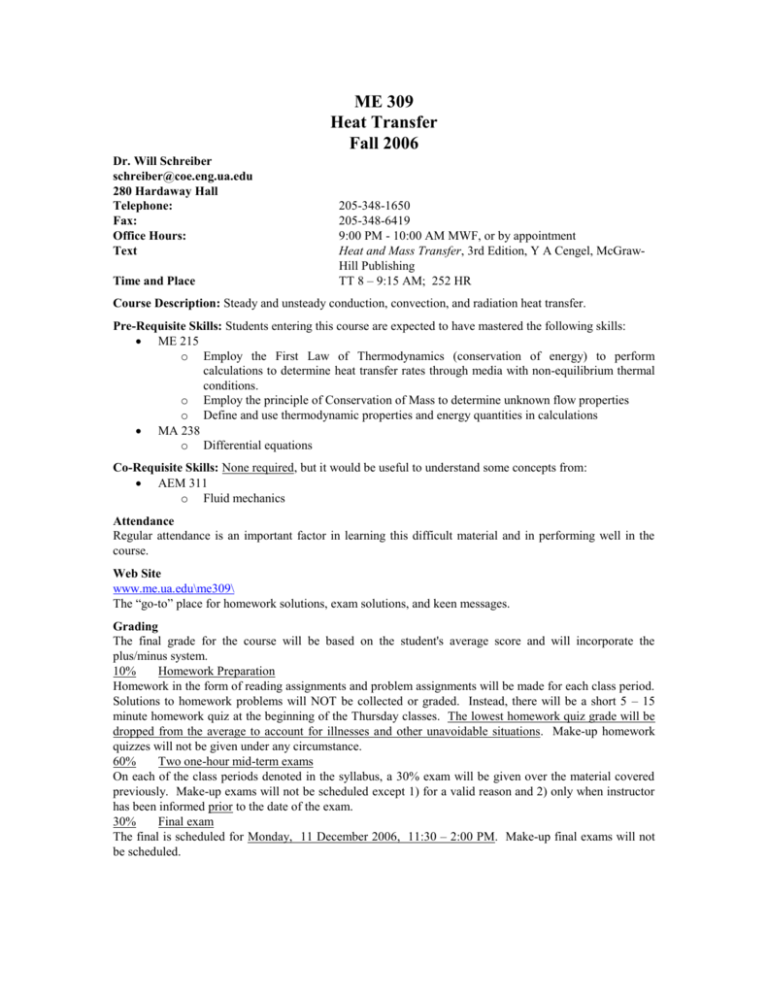
ME 309 Heat Transfer Fall 2006 Dr. Will Schreiber schreiber@coe.eng.ua.edu 280 Hardaway Hall Telephone: Fax: Office Hours: Text Time and Place 205-348-1650 205-348-6419 9:00 PM - 10:00 AM MWF, or by appointment Heat and Mass Transfer, 3rd Edition, Y A Cengel, McGrawHill Publishing TT 8 – 9:15 AM; 252 HR Course Description: Steady and unsteady conduction, convection, and radiation heat transfer. Pre-Requisite Skills: Students entering this course are expected to have mastered the following skills: ME 215 o Employ the First Law of Thermodynamics (conservation of energy) to perform calculations to determine heat transfer rates through media with non-equilibrium thermal conditions. o Employ the principle of Conservation of Mass to determine unknown flow properties o Define and use thermodynamic properties and energy quantities in calculations MA 238 o Differential equations Co-Requisite Skills: None required, but it would be useful to understand some concepts from: AEM 311 o Fluid mechanics Attendance Regular attendance is an important factor in learning this difficult material and in performing well in the course. Web Site www.me.ua.edu\me309\ The “go-to” place for homework solutions, exam solutions, and keen messages. Grading The final grade for the course will be based on the student's average score and will incorporate the plus/minus system. 10% Homework Preparation Homework in the form of reading assignments and problem assignments will be made for each class period. Solutions to homework problems will NOT be collected or graded. Instead, there will be a short 5 – 15 minute homework quiz at the beginning of the Thursday classes. The lowest homework quiz grade will be dropped from the average to account for illnesses and other unavoidable situations. Make-up homework quizzes will not be given under any circumstance. 60% Two one-hour mid-term exams On each of the class periods denoted in the syllabus, a 30% exam will be given over the material covered previously. Make-up exams will not be scheduled except 1) for a valid reason and 2) only when instructor has been informed prior to the date of the exam. 30% Final exam The final is scheduled for Monday, 11 December 2006, 11:30 – 2:00 PM. Make-up final exams will not be scheduled. Syllabus Class Subject Reading from Text Required for Class INTRODUCTION 1. Explanation of Syllabus, Conservation of energy, etc. and Review of Thermodynamics 2. 3 modes of heat transfer syllabus, sections 1.1-1.4 sections 1.5-1.10 CONDUCTION, 1-D, STEADY 3. Introduction to conduction , 1-dimensional 4. General Heat Conduction Equation 5. 1-D Solutions and Heat Sources 6. Resistance analogy 7. Fins sections 2.1-2.2 sections 2.3-2.4 sections 2.5-2.6 sections 3.1 - 3.3 section 3.6 CONDUCTION, UNSTEADY 8. Lumped Capacitance Method 9. Heisler Charts (1-D) 10. review classes 1 - 9 11. EXAM #1 classes 1 - 9. section 4.1 section 4.2 CONDUCTION, 2- and 3-D, STEADY 12. Numerical, Introduction 13. Numerical, Steady 14. Numerical, Transient section 5.1 - 5.2 sections 5.3 – 5.4 sections 5.5 CONVECTION HEAT TRANSFER (INTRODUCTION) 15. Boundary Layers 16. Fluid flow regimes 17. Dimensionless numbers sections 6.1-6.4 sections 6.5-6.8 section 6.9 – 6.11 CONVECTION HEAT TRANSFER 18. External flow 19. External flow 20. Internal flow 21. Internal flow 22. Internal flow 23. review classes 12 - 22 24. EXAM #2 classes 12 - 22. 25. Natural convection RADIATION 26. 27. 28. 29. 30. Radiation Properties " View factor Network analysis Review for final sections 7.1 – 7.2 sections 7.3 – 7.4 section 8.1 – 8.3 sections 8.4-8.5 sections 8.6 chapter 9 sections 12.1-12.3 sections 12.4-12.6 sections 13.1-13.2 section 13.3 – 13.5
![Applied Heat Transfer [Opens in New Window]](http://s3.studylib.net/store/data/008526779_1-b12564ed87263f3384d65f395321d919-300x300.png)
